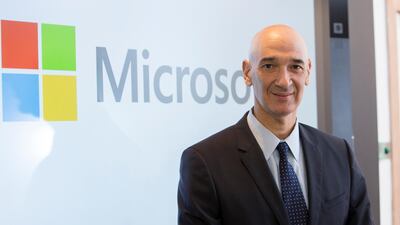Microsoft chose the UAE to open its first two data centres in the Middle East to meet the demand of a fourfold spending increase in cloud services forecast for the region between 2017 and 2022.
With new data centres in Abu Dhabi and Dubai, Microsoft’s global network has reached 54 and it will be launching eight more in the coming months. The investment in data storage in Saudi Arabia and the UAE - the Arabian Gulf's two largest economies - is set to rise to more than Dh1.5 billion in 2022, according to Massachusetts researcher International Data Corporation.
"There is a huge scope for cloud business ... with new data centres driving digital transformation, economic growth and job creation in the region," Sayed Hashish, general manager for Microsoft Gulf, told The National.
Without divulging the exact amount Microsoft invested in UAE data centres, Mr Hashish said: “We are investing billions of dollars across our data centres. Huge demand is giving us confidence to invest.”
For regional enterprises, moving to a cloud system hosted by a specialised company proves cheaper than creating their own infrastructure of servers, hardware and security networks.
“As all data stays in the UAE, it will enable government organisations to comply with local regulatory frameworks,” Mr Hashish added.
The public cloud services market in the Middle East and North Africa is projected to grow to $1.9bn (Dh7.97bn) by 2020, double what it was in 2016, according to Statista.
Microsoft’s technology and cloud services together will help create more than 110,000 jobs in Saudi Arabia and UAE by the end of 2022, according to IDC, with jobs in data science, blockchain architecture and AI.
For every new job created around the cloud ecosystem, four more jobs will be generated in other areas to complement it, said Mr Hashish.
“For every dollar or dirham that we (Microsoft) earn, nearly 10 times will be generated in the partner ecosystem ... revenue growth potential is immense.”
Microsoft, whose local clients include Emirates Airlines, Emaar Properties and Dubai Airports, reported a 73 per cent growth in its cloud business in the last quarter. Its global commercial cloud business was close to $10bn in the last quarter.
Several global players are establishing data centres in the Middle East. SAP is the front-runner in the race with three centres in the region in Dubai, Riyadh and Dammam, which house servers for local cloud computing clients.
Amazon Web Services will open at least three data centres in Bahrain this year. Comparatively a smaller player, Alibaba Cloud – the cloud computing arm of the Chinese e-commerce giant – opened its first regional data centre in Dubai in 2016.
American technology firm Equinix, an early provider of cloud services in the region that opened a data centre in Dubai in 2013, sees Dubai as an emerging hub for the cloud in the region.
Legislation, data security considerations and internet speed performance have all contributed, Jeroen Schlosser, managing director of Equinix MENA, told the The National.


